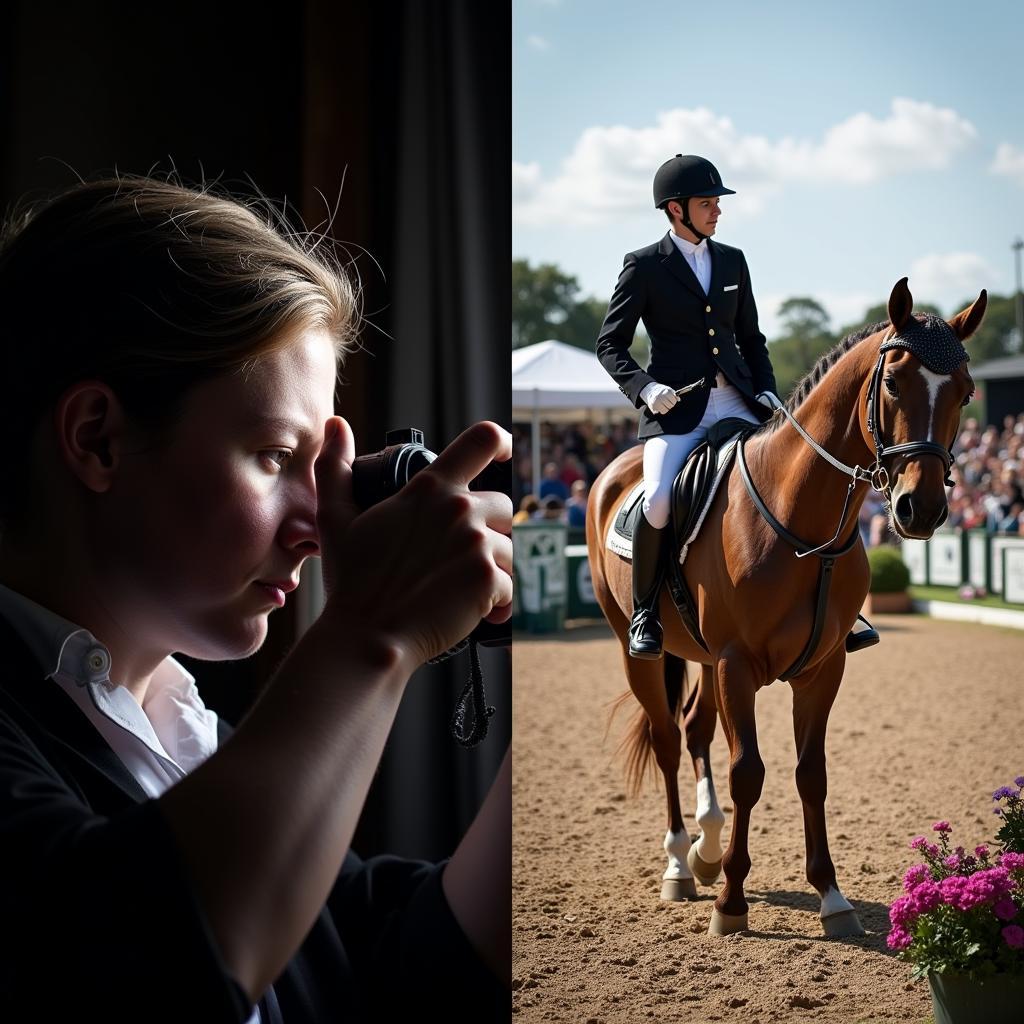Devon Horse Show photography encapsulates the power, grace, and athleticism of these magnificent animals in competition. Whether you’re a seasoned photographer or just starting out, capturing the perfect shot at Devon requires planning, skill, and a keen eye for detail. This guide will explore the nuances of Devon horse show photography, from equipment choices and composition techniques to understanding the unique challenges and rewards of this exhilarating discipline.
Choosing the Right Gear for Devon Horse Show Photography
The right equipment is crucial for capturing stunning images at the Devon Horse Show. A DSLR or mirrorless camera with interchangeable lenses is highly recommended. Consider investing in a fast telephoto lens, such as a 70-200mm or 100-400mm, to get up close to the action without disturbing the horses or riders. A wide-angle lens can also be useful for capturing the overall atmosphere and grandeur of the show.
A sturdy tripod is essential for maintaining stability, especially when using longer lenses. Don’t forget extra batteries and memory cards – you’ll be taking a lot of photos! A comfortable camera bag to carry all your gear is also a must.
Mastering Composition Techniques for Equestrian Photography
Composition is key to creating visually appealing and impactful photographs. When photographing horses in motion, aim to capture them at their peak action, whether it’s mid-jump, gracefully cantering, or executing a complex dressage movement. The rule of thirds can be a valuable guide, placing the horse off-center to create a more dynamic and balanced image.
Pay attention to the background and try to eliminate any distractions that might detract from the subject. A blurred background can help isolate the horse and rider, creating a more dramatic effect. Experiment with different angles and perspectives to add variety and visual interest to your photos.
Lighting and Exposure for Devon Horse Show Photography
Lighting can significantly impact the mood and quality of your photos. The ideal lighting conditions for outdoor horse shows are overcast days, as the soft, diffused light minimizes harsh shadows. On sunny days, try to shoot in the early morning or late afternoon when the light is less intense.
Adjust your camera’s exposure settings accordingly to ensure proper brightness and contrast. Shooting in RAW format gives you more flexibility in post-processing, allowing you to fine-tune the exposure and white balance.
Understanding the Challenges and Rewards of Devon Horse Show Photography
Devon horse show photography presents unique challenges. Horses are fast-moving subjects, and capturing them in the perfect moment requires anticipation and quick reflexes. The lighting conditions can also be unpredictable, requiring you to adapt your settings on the fly. However, the rewards are well worth the effort. Capturing the beauty, power, and athleticism of these magnificent animals is a truly rewarding experience.
 Challenges and Rewards of Photographing the Devon Horse Show
Challenges and Rewards of Photographing the Devon Horse Show
“Patience is key in equestrian photography,” advises renowned equine photographer, Amelia Hartford. “Anticipating the horse’s movements and being ready to capture the decisive moment is crucial.”
Another expert, David Miller, adds, “Understanding horse behavior is essential. Knowing when a horse is about to jump or perform a specific movement can help you anticipate the perfect shot.”
Conclusion
Devon horse show photography is a challenging yet rewarding pursuit. With the right equipment, a keen eye for composition, and a deep appreciation for these magnificent animals, you can capture breathtaking images that showcase the essence of equestrian sport. Remember to prioritize the well-being of the horses and riders, and respect the rules and regulations of the show. So, grab your camera, head to the Devon Horse Show, and capture the magic!
FAQ
- What lens is best for Devon horse show photography? A telephoto lens, like a 70-200mm or 100-400mm, is recommended.
- What camera settings should I use? Adjust your exposure settings based on the lighting conditions and shoot in RAW format for flexibility.
- When is the best time to photograph at Devon? Overcast days or early morning/late afternoon on sunny days provide ideal lighting.
- How can I capture sharp photos of moving horses? Use a fast shutter speed and anticipate the horse’s movements.
- What are some composition tips for equestrian photography? Use the rule of thirds, blur the background, and experiment with different angles.
- What are the challenges of Devon horse show photography? Fast-moving subjects, unpredictable lighting, and respecting show rules.
- What are the rewards of Devon horse show photography? Capturing the beauty, power, and athleticism of horses in competition.
Need help with your Devon horse show photography or looking for a professional photographer? Contact us at Phone: 0772127271, Email: [email protected] Or visit us at: QGM2+WX2, Vị Trung, Vị Thuỷ, Hậu Giang, Việt Nam. We have a 24/7 customer service team.